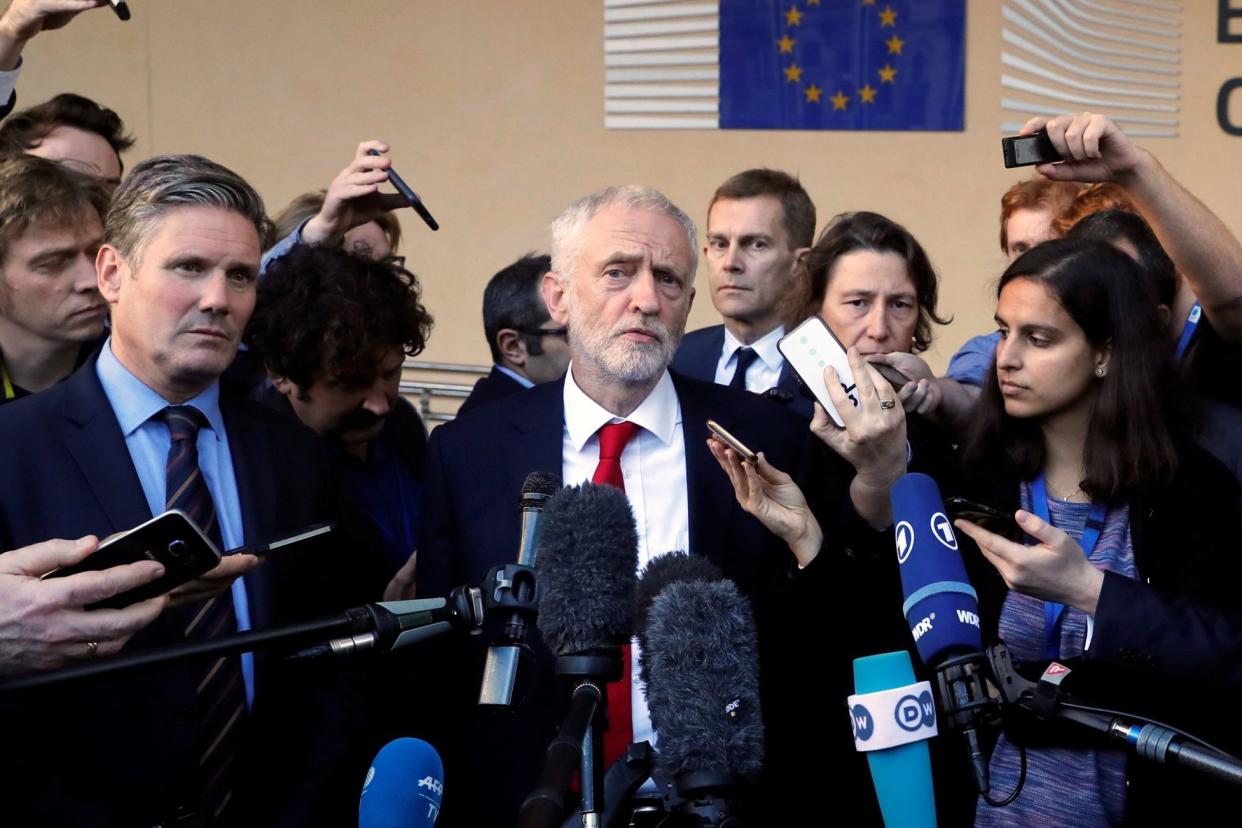Anne McElvoy: Is Labour in that much of a muddle that it’ll end up saving Mrs May’s skin?

When you’ve seen one Tory PM on the ropes, you’ve seen ’em all. First comes the dark numerology of the countdown to the 48 votes needed to tip a leader into a confidence vote. Commons interrogations follow. The Prime Minister announces that the EU withdrawal deal is “95 per cent there”, which is like saying a life-saving operation was “95 per cent successful”.
Tomorrow sees the next chapter of deathly hallows, the meeting of the 1922 Committee of backbenchers with tricoteuses giving briefings about knifings and death throes. It is 25 years since John Major endured the process. Plotting, though, is now in WhatsApp groups rather than late-night phone calls.
But the focus on her plight means too little attention is paid to what is happening on the other side of the House. The Opposition, rather than the Government, will decide the endgame of the Brexit negotiations and what follows. Number 10 tacitly accepts that it will rely on Labour voters to get any withdrawal bill that might eventually be agreed with the EU through Parliament.
A fit of ornery misconduct from the Ulster unionists has brought greater urgency to its calculations. So has May’s precarious position. So why would Labour save her skin in such a situation? Ordinarily, they would not dream of it. But these are not ordinary times. If a plainly disastrous No Deal scenario is to be avoided and there is a vote (or succession of votes) in Parliament on whatever offer May finally wrestles out of the EU, Labour will have an extraordinarily strong hand in the outcome.
It’s a curious situation, given that Corbynism frequently pits its grassroots organisation against MPs. But a sizeable number of Labour MPs regard Brexit as too important to be left to the mercies of a leadership whose only interest in the negotiations is as a tactical tool to bring about a quick general election.

So the prospect of the Tories securing enough borrowed support for a withdrawal deal to get it through Parliament looks within reach. It marks a resurgence of Labour’s significance in the Commons after a period when the party’s fate appeared to be decided in the closed councils of the leadership and pliant National Executive Committee.
Leading pro-European MPs are finding themselves invited to tea in the leader’s office. Camp Corbyn is starting to realise it cannot rely on MPs it has treated with disdain to vote down any imaginable deal. With due courtesy to Labour Brexit spokesman Keir Starmer, his “six tests” of acceptable deal criteria are like 50 ways to leave your lover — a neat number of excuses for doing what you wanted to do anyway.
Labour’s Brexit policy itself is elusive. It opposes no-deal scenarios but urges MPs to vote against any outcome that May could ever negotiate. Much would change, however, if a deal were really on the table. For a start there would be widespread public anticipation of an end to a long, puzzling and dull saga of little interest to voters with more pressing concerns. The pressure on not prolonging the agony would rise.
Furthermore, a blunt taxonomy of Remain and Leave doesn’t reflect the many nuances of opinion between MPs. Some Labour Remainers, encouraged by a confident showing in the People’s Vote march at the weekend, would prefer to galvanise arguments for a second referendum. But in a party reliant on blue-collar votes with strongholds in the North, that group is outweighed by those who fret that their constituents will cry foul if the “once in a lifetime” popular vote in 2016 is overturned.
Camp Corbyn is realising it cannot rely on MPs it has treated with disdain to vote down any imaginable deal"
A deal makes life easier for Labour Remainers representing constituencies that voted Leave, as long as something close to Brexit is delivered.
Others — such as shadow Brexit minister Jenny Chapman — have an overall pro-EU voting record but they also backed the Government in starting the withdrawal process, which makes it harder to explain why they would not wish to help conclude it. Another sub-group of desperadoes faces deselection and has no desire to continue under Corbyn, and thus has no need to fear the consequences of rebellion.
Graham Brady, chairman of the 1922 Committee and a yeoman of the Tory Right, is said to have told colleagues that the Government can get enough Opposition support to offset a hard Brexit rebellion. Downing Street would need around 20 to 30 Labour MPs voting with the Government to be sure of success (depending on the size of its own revolt, of course). This is a big ask, given that helping Tories out of a self-made hole is anathema to Labour MPs.
But Henry Newman, a former adviser to Michael Gove now at the (moderate Eurosceptic) Open Europe think-tank, believes compromise might be closer than many assume. The PM, he reckons, “failed to sell her Chequers plan because it demanded compromise without a deal. It is a lot easier to get compromise when a deal is on offer and the EU has put a name to it.”
The best way to peel off MPs who oppose no deal would be to pivot away from the Chequers plan and towards interim membership of the European Economic Area and the European Free Trade Association. If the Tories want to build a cross-party Brexit, this is the way to get it, because it builds on an existing appetite in Labour.
Even after a ferocious operation by the party whips, 75 Labour MPs rebelled in June to back the “Norway model” in an amendment proposed by Stephen Kinnock in June. Opposition sources estimate that around half of these have shifted their focus to a second referendum.
It still leaves a healthy number in the “wooing zone”, to cite a Tory whip. Building on that demands charm and persistence — and beguiling is not the word that springs to mind when it comes to the May method. But if she confounds her doubters to deliver the magic missing five per cent of the withdrawal deal, the benches opposite her own will write its fate, as much if not more than those behind her.
Anne McElvoy is senior editor at The Economist

 Yahoo News
Yahoo News 
